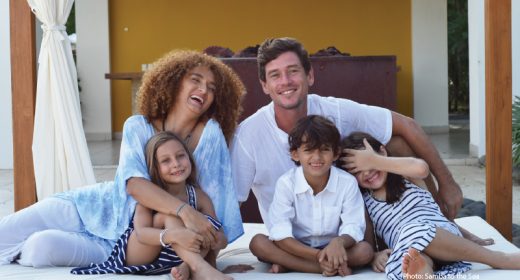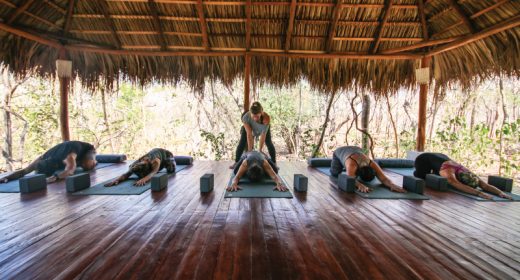
Lifestyle Feature – Raising a Child in Costa Rica
- SEP 04, 2017Warning: count(): Parameter must be an array or an object that implements Countable in /home/howlermag/public_html/old/wp-content/themes/new-paper/includes/general.php on line 193

Your Lead Paragrpah goes here
Living in Costa Rica means your children will get megadoses of outdoor time.
Many expat parents move to Costa Rica with an idyllic vision of their children living a different life — one full of freedom and an intimate connection with nature. Even for those who come to see it as the best decision they ever made, the transition may be tougher than imagined. Perhaps they didn’t foresee the kinds of struggles and cultureshock that are part of the pura vida dream package.
Relocating to a different country is an adventure of mind-boggling proportions. You have to deeply contemplate the positive and negative life-changing impacts, especially when kids are in the picture. It always takes a leap of faith, with knowledge as your safety net. Thorough research is the key to making informed decisions with confidence and mindfulness about what to expect.
 Education
Education
Costa Ricans take pride in their national literacy rate — an impressive 93 percent — and country-wide access to free public schools even in the remotest communities. Other educational options become more limited the further away from San José children are living, particularly in rural areas.
Private schools are the most popular choice among expats and higher-income Costa Ricans, offering enhanced quality of education, as well as safety, convenience, international recognition and multilingualism.
Homeschooling is another preference of many expat families. However, there is no accredited homeschool program for Tico children, who are legally required to attend a recognized public or private school until the sixth grade or age 14. Homeschooling is popular among teenagers who decide to work and “test out” their degree through either Maestro en Casa (14 years and older) or Bachillerato por Madurez (18 years and older). Both are distance learning systems established by the Ministry of Public Education (MEP). MEP exams may be taken by students whose school or learning method is not directly accredited in Costa Rica.
Cost of living
The cost of living in Costa Rica depends on location. In tourist areas like Tamarindo, renting a home can cost just as much as in some parts of the United States, or even more.
Local foods tend to be cheap, especially if you shop at farmers’ markets and buy foods that are in season. On the other hand, imported foods can be very expensive. Expect to pay at least twice or three times more for your favorite foods exported here from back home.
Technology is also expensive in Costa Rica due to high import taxes, at least double what U.S. consumers would pay for the same product. Locals and expats get around this by bringing back expensive items purchased while traveling or asking friends or family members to do so when coming to visit.
In fact, spending more on your “e-essentials” — or learning to live with less than you thought possible — can be the toughest relocation adjustment for parents and kids alike. Yet stories of expats who, begrudgingly or not, adopt a relatively minimalist lifestyle in Costa Rica often have a happy ending. Less stuff, they discover, can be liberating! As a bonus, pay rates for babysitters and domestic workers are a lot lower here, freeing up more leisure time for family members to enjoy.
Health care
Health care in Costa Rica is free for all children, regardless of nationality or insurance status. Working Costa Ricans and residents pay taxes to help support this vital public service called La Caja (CCSS). A drawback is that waiting lists are often long, which can be problematic in emergencies. Although many expats take advantage of La Caja, others prefer to pay for the convenience and superb quality of private health care. It’s also relatively affordable; routine visits to a family doctor cost around $50 and you’ll pay about $80 to see a specialist. International and national private insurance may be purchased from the National Institute of Insurance (INS) or other providers.
 Quality of life
Quality of life
Going to school and making friends in a foreign country is the best language immersion your kids could ever get. Before long, their Spanish chatter will be as fluent as a native speaker’s. This opportunity to grow up bilingual is a gift that lasts a lifetime. Neuroscience has shown the wondrous effects of language learning on a developing brain, while sociology explains how it expands cultural awareness. Economics research speaks to the increasing value of bilingual workers in the digital age of global connectivity.
“A good swim a day keeps the doctor away,” is how Costa Ricans attribute good health to the beach life. “Vitamin Sea,” as we call it, works with the sun’s amazing Vitamin D to help fend off sickness. If you’re up for a mountain trek instead, the air is just as fresh and the water just as pure. San José is another story, sadly, as far as pollution is concerned. Living in this metropolis does have perks though. You’re only a short drive away from nature, yet close to the amenities and fun stuff that city life offers.
Living in Costa Rica means your children will get megadoses of outdoor time. Within days, you’ll notice the changes …. from sun-kissed cheeks to athletic agility. Favorite outdoor pastimes for kids include hermit crab races, climbing trees, hide-and-seek, sliding down hillsides on a cardboard box and collecting fireflies in a jar. Maybe this sounds a bit like your own childhood or the good old days your parents used to talk about?
Costa Rica is a place where the magic of being young and free can last forever. It’s a way to see the world as your playground as children do.
Expat insights
Here are some insights that expat mothers with experience have shared with us (edited for length).
“Costa Rica is such a family-friendly culture. Everyone smiles at babies, and kids are welcome in restaurants and at gatherings. Compared to the U.S., medical care is very good and the cost is much more affordable. In the U.S., you always feel rushed at doctors’ appointments but, here, they really take the time with you. Whenever our kids are sick or have a medical issue, our pediatrician calls to check on them. My kids really enjoy the beautiful nature here, whether we’re hiking through the jungle looking for monkeys or spotting iguanas in our back yard. I’m not very happy with the educational options here. Public schools are lacking in many ways and private schools are not affordable, especially with two kids. Some of the cultural practices are interesting — advice such as keeping a baby wrapped up and out of the wind or else something bad will happen, or treating cuts and bruises with honey. I may return to the U.S. someday but our quality of life is better in Costa Rica.”
— Liz
“In Costa Rica, everyone is so caring towards babies and children. I received so much love and support being pregnant and even more after the kids came. Having one set of clothing all year round is awesome as well! I am so happy to raise my children here.”
— Robin
“I love getting to spend so much time with my kids, and the relaxed lifestyle we enjoy together. Another big pro is the exposure kids receive from other cultures. They are more open to connecting with new people and embracing new experiences. Health care has been sufficient for our needs. We miss the museums, educational programs and sports activities. Also, I wish there was a public library. Our kids have attended two private schools and we have had issues with both. The other options are beyond our budget and acceptable driving distance. We’ve only considered going back so our boys can receive an education that better prepares them for their desired careers. ”
— Michelle
“We moved from Canada in 2016 with a 4-year-old and a 4-month-old, and it’s been an adventure. We chose Costa Rica for a lifestyle change — a slower pace and more family time together. We also wanted to be closer and more connected to nature. We love the Pura Vida vibes, how friendly and open people are, and the positive energy from both the locals and expats from all over the world. We’re also very happy with the education system so far, since our daughter has been in school. As for health care, we had a great one in Canada and are happy with what Costa Rica offers. What we miss: city life in Toronto – the variety of foods and restaurants, music events and festivals, museums and art galleries, children’s programs, and community centers.”
— Tasha
“We moved from New York City in 2014 with a 5-month old and a 5-year old. In the beginning, our biggest challenge was navigating the new culture and figuring out the educational options. The solution was finding the Waldorf School for our older boy. I was concerned about the relaxed grading system at first. But after visiting NYC, where all my nephews are in gifted programs with rigorous testing, I realized my son is just as well-rounded and developed as they are, if not moreso. Plus, he has an additional three languages.
Our second challenge was activities for kids. We scratched our own itch by opening a non-profit kids jiu jitsu program in Tamarindo. We also put in a lot of toys for toddlers’ free play. Now our kids are always busy, even when it rains. For culture (museums, plays, and city life), we take advantage of the occasional $300 round trip tickets to NYC. By day four, the kids are usually asking when we will go home. That’s our reminder that we made a good choice.”
— Lola
“There are many reasons why we love Costa Rica, such as countless hours at the beach connecting with nature, pace of life, warmth of the people, and opportunity for our kids to enjoy friendly, non-competitive after-school activities. A big part of our happiness is the great school they attend. The Waldorf school in Guanacaste is filled with loving and caring teachers. It’s great when your kids want to go to school every morning, where they gain confidence in themselves, learning life skills, all in a natural environment. We all love it!”
— Catherine









